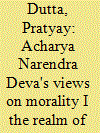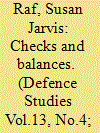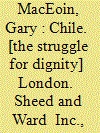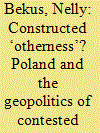|
|
|
Sort Order |
|
|
|
Items / Page
|
|
|
|
|
|
|
| Srl | Item |
| 1 |
ID:
130826


|
|
|
|
|
| Publication |
2014.
|
| Summary/Abstract |
Acharya Narendra Deva strongly believed that the Gandhian ideas based on morality and ethics could be the only solution to meet the basic needs of a society both developing and developed. It was thus that even after independence, he wielded the Gandhian weapon of Satyagraha most effectively to ?ght every form of injustice against the oppressed and the depressed in the then Indian society. Like Gandhi, he gave the highest priority for the removal of rural backwardness and he was in favour an innovative technology that could help in bringing an all round development in a developing society. He was a profound thinker who could analysis political, economic and social problems in their totality and his socio~political ideas about the solution to the problems facing the nation and society was exclusively original in its entirety. Narendra Deva accepted the value of morality and ethics of Gandhi and practised it fully throughout his whole life. It was Gandhi, who ?rst demonstrated the powerful effect on his countrymen of renouncing wealth for the sake of human service rather than personal salvation and Deva had trodden the same pathway into lndia's heart. Gandhi and Narendra Deva acquired their moral strength through renunciation, much as lndia's ancient sageswere supposed to obtain magical powers through their austerities. Their magic was singleness of purpose and an iron will. When Deva joined the Indian political
struggle under Gandhian leadership, the Mahatma once told him to simplify life and he took his words to heart. They never urged anyone else to follow their way of life and went their own way with a striking serenity. As a leading intellectual of outstanding mould, Acharya Narendra Deva had a forceful urge to bring about social justice, processed through a strong vein of idealism and always expressed deep concern for the down- trodden lndian masses. He remained a path?nder of the socialist movement in India and strongly believed that freedom was the first postulate for the establishment of the socialist society in India. He felt that without political independence the socialist programme could never become a reality. Narendra Deva always emphasized the moral and cultural elements of Marxism, but in the Indian socio-political context, he said that the class con?ict was already in existence and the real question was on whose side you were going to stand. Moreover, it was wrong to assume that the capitalist class had no vested interest in the freedom struggle. He, therefore, viewed that the socialists should create consciousness among labour, convince them that their interest would be well protected inn the freedom struggle and should broaden the base of that struggle by organizing the toilers. That is why; Gandhi and Deva wanted the historical stream of the cultural progress of India, in order to sustain the flow of continuity. In fact, Gandhi and Narendra Deva's entire socio-political ideas were ofa new social order purely based on universal love, ahimsa, morality and most importantly the role of ethics in Indian politics. Gandhi's ideal society was a non-violent and stateless society and repudiated state on ethical, historical and economic grounds. Unlike Marx, Gandhi and Deva persistently put emphasis on moral force and on the - realization of one's own self and there was no place for violence in their whole socio-political philosophy. The purpose ofthe article is to highlight the impact of ethics and morality on Narendra Deva's socio-political ideas and its relevance in the 21" century.
|
|
|
|
|
|
|
|
|
|
|
|
|
|
|
|
| 2 |
ID:
128241


|
|
|
|
|
| Publication |
2013.
|
| Summary/Abstract |
On 30 November 2000 the UK Government enacted legislation leading to the formalisation of freedom of official government information (within specified bounds) for the UK voting public. The Freedom Information Act (FOI Act), although passed into law in 2000, did not come into full effect in the UK until January 2005. In order to 'police' the Act, the Information Commissioner's Organisation (ICO) was set up. The ICO is responsible for monitoring the performance of 43 government bodies1 against performance requirements under the FOI Act 2000. This includes a deadline for responding to initial Requests for Information (RFIs) of 20 working-days. The ICO also handles any unresolved2 complaints or disputes concerning non-disclosure or late release of information requested under an RFI.
To head the ICO, the new post of Information Commissioner was created in January 2001, subsuming the previous role of the Data Protection Registrar.3 The incumbent works within the bureaucracy of the Ministry of Justice (MOJ), reporting directly to Parliament in order to remain politically independent.4 The powers of the Information Commissioner include the use of various levels of sanction. These include formal legal action against government bodies that fail to comply with the provisions of the FOI Act 2000 and other related information legislation.5 Every quarter, and annually, the UK Statistics Authority, on behalf of the ICO and the MOJ, reports on the performance of all 43 monitored government bodies against the requirements of the FOI Act 2000.
|
|
|
|
|
|
|
|
|
|
|
|
|
|
|
|
| 3 |
ID:
045209


|
|
|
|
|
| Publication |
London, Sheed and Ward Inc, 1974.
|
| Description |
230p.hbk
|
| Standard Number |
0904576043
|
|
|
|
|
|
|
|
|
|
|
|
Copies: C:1/I:0,R:0,Q:0
Circulation
| Accession# | Call# | Current Location | Status | Policy | Location |
| 016743 | 983.0646/MAC 016743 | Main | On Shelf | General | |
|
|
|
|
| 4 |
ID:
151827


|
|
|
|
|
| Summary/Abstract |
The rise of Belarus to political independence has required it to delineate its cultural boundaries in-between two ‘Others’—Poland and Russia. This essay explores a range of portrayals of Poland in Belarusian cultural artefacts, including television programmes, film, novels, and theatre performances—from the image of an ‘Other’ that threatens Belarusian identity, to the main ally supporting the European choice of Belarusians. Examples from Belarusian cultural texts analysed in the essay show how representations of Poland are grounded in selective and ideologically driven interpretations of Belarus’s own past, while their coexistence reveals the contested nature of the geopolitics of Belarusian identity.
|
|
|
|
|
|
|
|
|
|
|
|
|
|
|
|
|
|
|
|
|